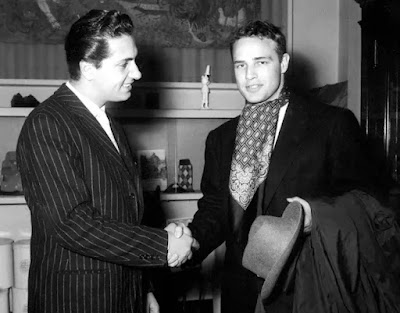https://www.battistoni.com/battistoni-world/
Battistoni World
Our House
kept its original residence since birth and never swayed from its mission
statement, a credo of classical elegance.
Friends
While all
the connaisseurs were to pay a visit and
tribute to Battistoni’s talent in perfecting a suits’ cut and shirts collars
(the inimitable reverse-stitched rim), quite a few artists, writers and actors
unconsciously, by the frequency of their visits, became “adopted” by
Battistoni. So much so that Guglielmo yesterday – and Gianni and Simonetta
today – undersigned ‘certificates of friendship’, with well targeted
generosity. They consist of a sort of chivalric order, with no emblems or
decorations, but behind which only talent and personal qualities count. It is
so that when Mr. and Mrs. Chaplin chose their neckties and shirts, they would
just add onto their tab at the shop; when Steinbeck was to take notes for his
‘East of Eden’, he would do so at his favourite Battistoni desk, wearing his
famed Battistoni check shirt.
Humphrey
Bogart kept a bottle of his preferred
whiskey in a cabinet at the shop, as if he had joined a club, while Gentilini
and his circle of friends would keep long tabs, indirectly having the House of
Battistoni sponsoring their trips and their art. Roman style pouring down from
Trinita’ dei Monti and the Spanish
steps, to the heart of the city, like a
river touching Piazza di Spagna and
streaming down Via Condotti, the Caffe’ Greco, the silversmiths’ shops, and in front of
Palazzo Torlonia, designed by Bernini,
by the Sovereign Military Order of Malta,
by the old Alinari shop, dwelling of Roman iconography. Arrived so far, facing
the seraphine in the limpid courtyard’s fountain, and near the unique works of
art adorning the Battistoni atelier, here they come. Princes and queens,
tycoons, aristocrats, the actor of the moment, the writer, the celebrity, the
poet and the entire Beau Monde! One after the other, the most charming
(possibly Kirk Douglas) along with the shyest (almost certainly Ben Kingsley),
all equally treated by Guglielmo Battistoni, with that spontaneity and disenchantment that makes the true Roman perfectly at ease in front of a head of state
or a peasant.
The list
would be endless: Luchino Visconti and John Ford, Gianni Agnelli and
Rockefeller, Moravia, Malaparte and Jean Cocteau, Tyrone Power and De Sica,
Ingrid Bergman and Audrey Hepburn,
Josephine Baker and Anna Magnani, Hermes and Lagerfeld, Dado Ruspoli, Prince
Torlonia, Prince Orsini, and the list carries on. Today these stories, at times
narrated by old clerks or Mr. Battistoni, are silently reflected into the walls
and mirrors, and they charmingly
permeate Battistoni’s Rome store with their subliminal tales.
Heritage
In the
distant year of 1946, only a handful of people knew of 61A, Via Condotti. It
was at this address, tucked away from the sight of passers-by, that Guglielmo
Battistoni started out as a shirt maker. He was first and foremost a dreamer. A
creator at heart, whose passion for details and style mingled his form of art,
with many other fields. His atelier was, and still is, the mirror image of its
owner.
Battistoni
never believed in following trends. Instead he believed that “to try to set the
trends and dictate the norms, albeit for one single season, in something as
fickle and fanciful as fashion, is like forcing a swallow to fly in a straight
line instead of letting it follow its arabesques.” Perhaps hidden in these
words we can find hints of the creativity that fueled Guglielmo Battistoni and
his friends to infuse into Via Condotti an alternative way of being. They are
credited with transforming this stretch of land into the destination for its
infamous habitués.
It was a
gradual and natural procession for this street to be transformed into a place
to be, and the Battistoni store became a much sought-after club-house scene. A
haven for monarchs past and present, for magnates of industry and finance, for
aristocrats, artists, writers, actors, and directors. But, with all due respect
to Federico Fellini, it should immediately be said, that Via Condotti never
wanted the fame of the Via Veneto of “La Dolce Vita”. They were two different
streets with two different ethos. Via Condotti’s public was quite different and
far from the impulsive crowds of Via Veneto. Battistoni’s acolytes were focused
on turning their (Battistoni clad) backs on the exhibitionism and advertising
found on Via Veneto. Because of this, the daily salons of Via Condotti became
the natural home for the hard core of Café society and the workshop at No. 61A
kept a record of all its illustrious customers, jealously protected, of course.







No comments:
Post a Comment